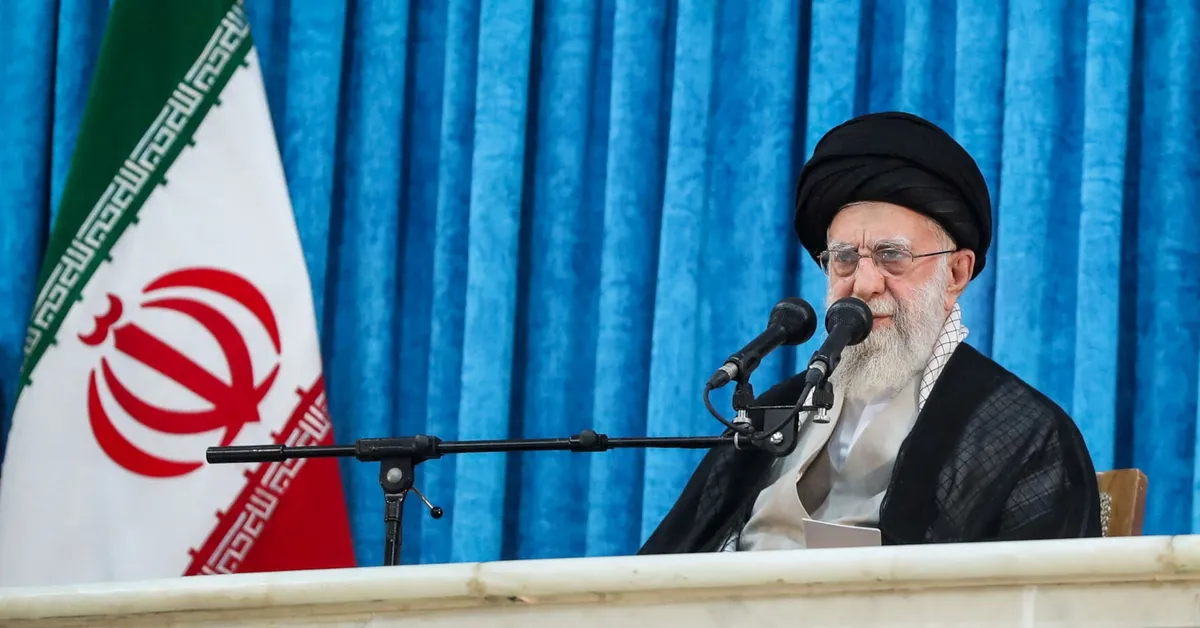
DUBAI/LONDON, June 17 (Reuters) - Iran's Supreme Leader Ayatollah Ali Khamenei, aged 86, is increasingly portraying a sense of isolation as he navigates a perilous landscape of military and political challenges. Recent Israeli airstrikes have decimated his primary military and security advisers, leading to significant gaps in his decision-making circle and heightening the risk of strategic miscalculations, according to multiple sources familiar with his inner workings.
One source, who frequently attends meetings with Khamenei, expressed grave concerns regarding the potential for miscalculations in Iran's defense and internal stability, describing the situation as "extremely dangerous." The recent deaths of several senior military commanders, including key figures from Iran's Revolutionary Guards, have further strained Khamenei's leadership. Notable casualties include Hossein Salami, the overall commander of the Guards, as well as Amir Ali Hajizadeh, the chief of aerospace who oversaw Iran's ballistic missile program, and Mohammad Kazemi, the spymaster.
These commanders were integral members of Khamenei's inner circle, which typically consists of around 15-20 advisers, including commanders from the Guards, clerics, and politicians. These meetings are often convened on an ad-hoc basis when Khamenei's office calls upon relevant advisers to gather at his Tehran compound to deliberate on significant decisions. All sources report that the advisers demonstrate unwavering loyalty to Khamenei and the ideology of the Islamic Republic.
Khamenei's past experiences, including imprisonment before the 1979 revolution and surviving a bomb attack prior to his ascension as leader in 1989, have profoundly shaped his commitment to preserving Iran's Islamic governance. He harbors a deep-seated mistrust of Western powers. In Iran's governmental structure, Khamenei holds supreme authority over the armed forces, possesses the power to declare war, and has the ability to appoint or dismiss key figures, including military leaders and judges.
Despite holding the final say on critical national matters, Khamenei values the input of his advisers, actively engaging with diverse viewpoints and often requesting additional information from his counselors. Alex Vatanka, director of the Iran Program at the Middle East Institute, described Khamenei as "extremely stubborn but also extremely cautious," attributing his prolonged tenure to his careful evaluation of risks, particularly regarding the survival of the regime.
The imperative of regime survival has been consistently tested throughout Khamenei's leadership. He has deployed the Revolutionary Guards and the affiliated Basij militia to suppress national protests in 1999, 2009, and 2022. While the security forces have historically managed to outlast demonstrators and restore order, prolonged Western sanctions have inflicted severe economic hardship, which analysts warn could incite significant internal unrest.
As Khamenei confronts escalating hostilities with Israel, which has targeted Iranian nuclear and military sites through air attacks, the stakes have never been higher. Insiders and analysts indicate that retaliatory missile strikes from Iran have become common as the situation intensifies. Despite the recent losses, the five individuals familiar with Khamenei's decision-making assert that many advisers who have not been targeted remain influential. These advisers cover a spectrum of political, economic, and diplomatic issues, allowing Khamenei to maintain a direct influence over various state institutions.
In this intricate web of governance, Khamenei's son, Mojtaba, has emerged as a pivotal figure over the last two decades. He has cultivated relationships across different factions and organizations to coordinate on pressing issues, positioning himself as a potential successor to his aging father. His connections with the Revolutionary Guards have further enhanced his influence within Iran's political and security milieu.
Key figures like Ali Asghar Hejazi, Khamenei's deputy for political security affairs, also play crucial roles in sensitive security decisions, often regarded as Iran's most powerful intelligence official. Alongside him, trusted confidants such as Mohammad Golpayegani, former foreign ministers Ali Akbar Velayati and Kamal Kharazi, and ex-parliament speaker Ali Larijani offer their insights on diplomatic and domestic policies, including the complex nuclear dispute.
Despite these relationships, the recent deaths of top Revolutionary Guards commanders have significantly weakened Khamenei's military leadership. Since ascending to power in 1989, Khamenei has relied heavily on the Guards for both internal security and regional strategy. While the regular army commands fall under the defense ministry, the Guards report directly to Khamenei, securing advanced military resources for their operations.
As Iran faces one of the most precarious moments in its history, Khamenei's isolation is further exacerbated by the loss of key regional allies. The death of Hassan Nasrallah, the leader of Hezbollah, in an Israeli airstrike last September, and the fall of Syrian President Bashar al-Assad, have created a more challenging environment for Iran's Axis of Resistance coalition.
In conclusion, as Ayatollah Ali Khamenei grapples with the challenges of leadership amidst a landscape fraught with military threats and internal discontent, the coming months will be critical for the future of Iran's political landscape and its Islamic Republic.